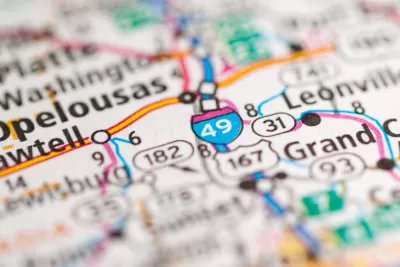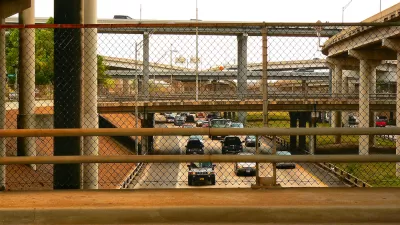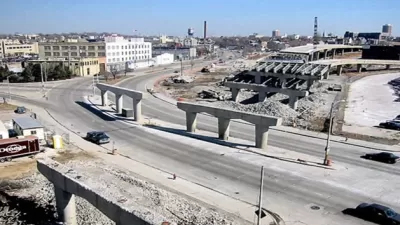An interstate project decades in the making is being investigated by federal authorities for claims that it would perpetuate historically racist land use patterns.

A federal civil rights investigation could alter the design of an interstate expansion project in Lafayette, Louisiana that has been ongoing for four decades. As Stephen Marcantel reports in The Current, if a similar case in Houston is any indication, the I-49 Connector project will likely go forward with changes and mitigation measures.
The investigation is the result of a resident complaint claiming that “the Connector’s path was laid along lines drawn in a 1923 ordinance that bisected Lafayette into white and Black communities” and would perpetuate the inequities created by the city’s historic segregation policies.
The case highlights the ongoing struggle of urban communities to gain recognition of the damage caused by freeway construction, despite federal initiatives like the Reconnecting Communities Act. However, “Some argue the Connector itself represents a way to fix a broken situation along the Thruway. Neighborhoods there have been in limbo for decades, lacking investment while the project hung in the air incomplete.” Shawn Wilson, outgoing director of the Louisiana Department of Transportation and Development and a supporter of the project, wrote in a statement, “While I understand this project will not meet the approval of everyone, and some opponents will go to great lengths to stop it, one thing we know for sure is that doing nothing is an unacceptable alternative.”
Federal officials could, like in the Houston case, require a range of changes to the plan, including “Air quality monitoring, sound barriers for neighborhoods, lighting and sidewalks for improved pedestrian safety, flood mitigation, connecting neighborhoods, improving public transit and creating green spaces.”
FULL STORY: How a civil rights investigation could alter the I-49 Connector

Alabama: Trump Terminates Settlements for Black Communities Harmed By Raw Sewage
Trump deemed the landmark civil rights agreement “illegal DEI and environmental justice policy.”

Study: Maui’s Plan to Convert Vacation Rentals to Long-Term Housing Could Cause Nearly $1 Billion Economic Loss
The plan would reduce visitor accommodation by 25% resulting in 1,900 jobs lost.

Planetizen Federal Action Tracker
A weekly monitor of how Trump’s orders and actions are impacting planners and planning in America.

Waymo Gets Permission to Map SF’s Market Street
If allowed to operate on the traffic-restricted street, Waymo’s autonomous taxis would have a leg up over ride-hailing competitors — and counter the city’s efforts to grow bike and pedestrian on the thoroughfare.

Parklet Symposium Highlights the Success of Shared Spaces
Parklets got a boost during the Covid-19 pandemic, when the concept was translated to outdoor dining programs that offered restaurants a lifeline during the shutdown.

Federal Homelessness Agency Places Entire Staff on Leave
The U.S. Interagency Council on Homelessness is the only federal agency dedicated to preventing and ending homelessness.
Urban Design for Planners 1: Software Tools
This six-course series explores essential urban design concepts using open source software and equips planners with the tools they need to participate fully in the urban design process.
Planning for Universal Design
Learn the tools for implementing Universal Design in planning regulations.
Caltrans
Smith Gee Studio
Institute for Housing and Urban Development Studies (IHS)
City of Grandview
Harvard GSD Executive Education
Toledo-Lucas County Plan Commissions
Salt Lake City
NYU Wagner Graduate School of Public Service





























